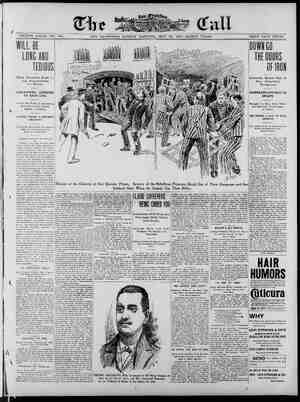The San Francisco Call. Newspaper, May 30, 1897, Page 17
You have reached the hourly page view limit. Unlock higher limit to our entire archive!
Subscribers enjoy higher page view limit, downloads, and exclusive features.
FRANCISCO, SUNDAY MOR? T N San Francisco there are | Deplorable as it is that there be men so three peaceful spots |careless of their brothers’ memory in where our dead soldiers | d=ath, and so hesdlsss of that grateful | oM are buried. The Na- pect which is due to the battle-slain | % M tion’s Cemetery at the | patriot from those who live to enjoy thei Presidio has one portion, | fruits of his noble sacrifice as to spend in | called the ex-veterans’ | boisterous sport the day set apart in his| plat, in which only those | honor, there is a sense of gratification who fought in the la k and dignity to be derived from the as-| rebellion can be laid. The Odd Fellows’ | surance that the rest of us refuse to| Cemetery also has a G. A. R. plat in | make a holiday of it. We know it only which sixty old soldiers are resting. | @ ay on which to do our duty by the | esides these two there is a Grand Army And. it fills us with peace and the | y—a portion of the City Ceme- rting knowledge of a duty w:li; n which only the Grand Army don: to note that *‘every grave is fair:mdi Ay Sy green—none neglected.” | trange experience to v Odd Fellows’ Cemetery has had its | ist before the National plat filled for some tim=. No less fair is | n the friends of the dece it than the Presidio plat, and it differs of their be only in that a low fence separates it from | ars | the other portions of the cemetery. There | the | S = i the | ov loving thoug tombstone in theil SAN which is the chief horror of death. stained faces. There are some while the elders look on and weep. mourners coms to view the place and I Here and there the mourn ers tread softly with their baskets of blossoms and their tear- new mounds with just a few blades of grass springing up into God’s sunlight, and children strewing blossoms over them, | the knowledge of grief in their hearts—are And ~ ) & 2 7 = "/’C’ k! e N\ /(; AN | ihe flowers that have lain a long while | their gift of flowers on the graves, while | look pitifully withered and faded, as i memory softly traces across.their faces | though they longed for the darkness of lines of grief, longing and bereavement. The third, and last, the Grand Army | fair faces into the warm grass and smile Cemetery, impresses one as the saddest | themselves away—cheerful offerings to spotof all. Viewing it from the car lines, | courage. it looks so gioomy that instinctively you ! And they wander in and out together, walk slowly and solemnly up to the gate | all these human beings, for death brings and pass in with a sigh. “ There is. tlie | all to one level—the living as well as the same green grass covering mounds of the same length and breadth and depth, and | reserve, walked to th= graves beside the one begins to feel that fanciful preciseness | bowed mother broken in body and soul | oblivion. The fresh blossoms nestle their dead. The proud woman, in her cloak of | by struggles with a conquering world. There are the young with their careless laughter and the old with their knowledge of reality. The maimed and the halt, and even the blind—and all with the per- fume of the flowers in their nostrils, and there. But over all, mingling with the sunshine and the passing breeze and pervading everything, is the feeling of gratitude that such men were buried there. The world is better because they lived and nature smiles at their return into her bosom. It is hard to realize in the midst of all this peace and beauty of nature that those who were buried there were once young and stalwart, once stood and listened to the news of their country’s trouble, and casting all aside—future ambitions, hope, | love, home, everything that a mortal holds ‘dear, . went bravely forth to battle, to face death. Not one of us but has heard the tales of weary marches, of sleepless nights in dread places, of the death of comrades and heartrending scenes with loved ones. And not one of these who returned to finish their life in peace but brought with him something to prove his courage. To most of them it was broken health, some complaint contracted in the dire ex- posure. Others had scars, but the kind of scars that do not disfigure but beautify. Little wonder is it, then, that a nation honors them, and their countrymen are proud to lay offerings upon their last resting place. It is no wonder that loved ones in great numbers gather about with loving remembrance. Not a flower is laid there but blossomed for them, not a breeze sighs over the graves but brings some message to them. Every beam of sunshine is more warm on their grass- grown mound, for not one rests there who i is not a hero.
